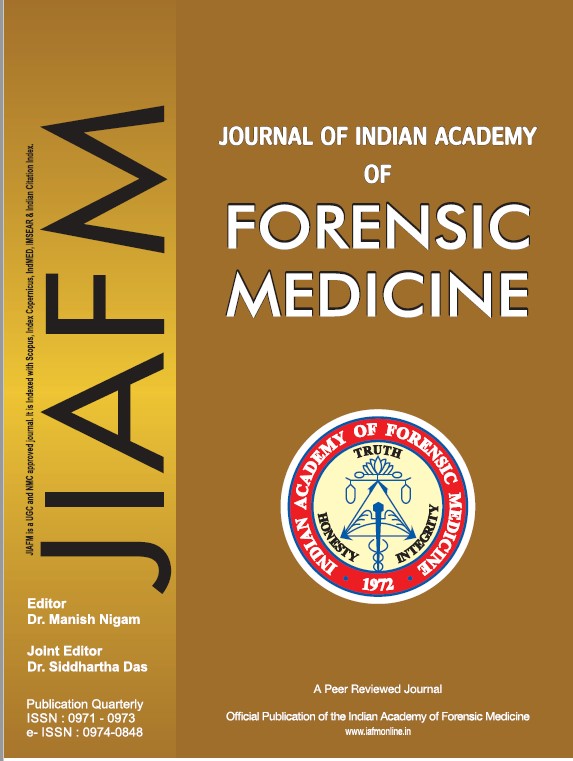The Morphological Differences between Acute Tubular Necrosis and Autolysis: An Autopsy Study
DOI:
https://doi.org/10.48165/jiafm.2023.45.4.21Keywords:
Acute tubular necrosis, Autolysis, Autopsy, Histology, Ischemia, Tubular epithelial whorls, Kidney, Renal, RenalVacuolationAbstract
The post-mortem identification of acute tubular necrosis (ATN) and autolysis poses a considerable challenge due to overlapping pathological features. This study was therefore conducted with the objective of identifying morphological characteristics that will assist in differentiating between ATN and autolysis in post-mortem renal specimens. This analytical study included all samples received by the department of Pathology from individuals who were clinically diagnosed as ATN and satisfying defined biochemical parameters. Age and sex matched control specimens were chosen from healthy individuals who suffered an accidental or sudden death and who satisfied defined exclusion criteria. Atotal of 82 samples were included. There were samples from 25 males and 16 females in each group. The mean age of the cases was 42.12 ± 18.27 years while the mean age of the control group was 49.65 ± 16.64 years. The gross weight of the kidneys was not found to be significantly different between the two groups. Three morphological characteristics were found to significantly vary between the cases and controls: cell vacuolation (P=0.029), hematopoietic cells in the vasa recta (P=0.003) and tubular epithelial whorls (P=0.0002). Of these, tubular epithelial whorls were found to have the highest validity (sensitivity=0.88, specificity=0.92). Tubular epithelial whorls can be used independently or in conjunction with other morphological criteria in order to accurately identify ATN in post mortem renal tissue.
Downloads
References
Basile DP, Anderson MD, Sutton TA. Pathophysiology of acute kidney injury. Compr Physiol [Internet]. 2012 Apr [cited 2021 Jun 17];2(2):1303–53. Available from: /pmc/articles/PMC3919808/
Kumar J. Pathophysiology of ischemic acute tubular necrosis. Clin Queries Nephrol [Internet]. 2012;1(1):18–26. Available from: http://dx.doi.org/10.1016/S2211-9477(11)70006-1
Alpers CE. The Kidney. In: Kumar V, Abbas AK, Fausto N, Aster JC, editors. Robbins and Cotran Basic Pathology. Eight. Elsevier; 2017. p. 549–81.
ISSN : 0971 - 0973, e - ISSN : 0974 - 0848
Zdravkovi M, Kostov M, Stojanovi M. Identification Of Postmortem Autolytic changes On The Kidney Tissue Using PAS Stained Method. Facta Univ Ser Med Biol. 2006;13(3):181–4.
Kocovski L, Duflou J. Can renal acute tubular necrosis be differentiated from autolysis at autopsy? J Forensic Sci. 2009;54(2):439–42.
Kellum JA, Lameire N, Aspelin P, Barsoum RS, Burdmann EA, Goldstein SL, et al. Kidney disease: Improving global outcomes (KDIGO) acute kidney injury work group. KDIGO clinical practice guideline for acute kidney injury. Kidney Int Suppl [Internet]. 2012 [cited 2021 Dec 28];2(1):1–138. Available from: https://experts.umn.edu/en/publications/ kidney-disease-improving-global-outcomes-kdigo-acute
kidney-injur
Payne-James J, Jones R, Karch SB, Manlove J. Simpson's Forensic Medicine. Thirteenth. Hodder Arnold. London: Hachette UK; 2011. 1–264 p.
Rutty GN. The Pathology of Shock Versus Post-mortem Change. Essentials Autops Pract. 2004;(1):93–127.
Padanilam BJ. Cell death induced by acute renal injury: a perspective on the contributions of apoptosis and necrosis. Am J Physiol Ren Physiol [Internet]. 2003 [cited 2021 Jun 17];284:608–27. Available from: http://www.ajprenal.org
Salinas-Madrigal L, Sotelo-Avila C. Morphologic Diagnosis of Acute Tubular Necrosis (ATN) by Autofluorescence. Am J Kidney Dis [Internet]. 1986;7(1):84–7. Available from: http://dx.doi.org/10.1016/S0272-6386(86)80060-9


